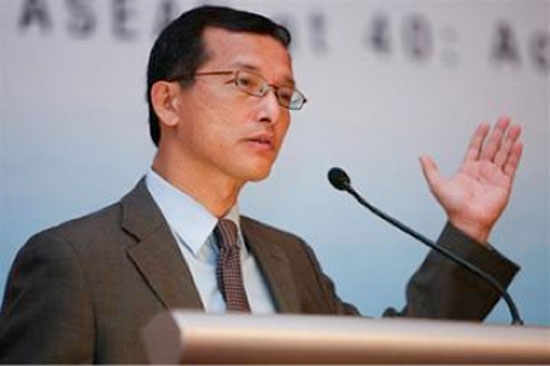Simon Tay: America Must Reengage Asia

NEW YORK, Sept. 17, 2010 - America's shrinking influence in Asia is cause for concern for both Asians and Americans, argues former Asia Society Bernard Schwartz Fellow Simon Tay in his new book, Asia Alone: The Dangerous Post-Crisis Divide from America. In a conversation here with Jamie F. Metzl, Executive Vice President of Asia Society, Tay argued that America's time as the world's lone superpower is rapidly coming to an end.
"America is relatively in decline," declared Tay. "Now, I use the word ‘relatively'—it is very important. I am not one of those who look past America."
Tay believes that rather than viewing Asia's rise as a threat, America should seek to redefine its relationship with Asia. Asian countries, meanwhile, should recognize that their relationship with America is still vital.
According to the author, America's declining influence in Asia could first be felt during the second Bush administration. Bush's foreign policy adventures hurt America's image in Asia and showed that despite military superiority, America's power had clear limits. America's soft power—its ability to lead by example—was "run down." Yet the real "inflection point" came with the economic crisis of 2009.
Before the crisis, Asia and America shared in the benefits of continuous economic growth. Since the crisis, however, much of Asia has continued to rise in economic and political clout while America has receded. The Obama administration, says Tay, has shown a willingness to engage Asia, and has therefore remained popular throughout most of the region. Yet the American public has been "distracted" from engagement with Asia.
"My reading of American domestic politics is that Asia is important but not urgent," says Tay. "When you look at Iran or North Korea, [these are seen as] urgent problems that need to be addressed. The larger important question of engaging Asia, to tap into economic and other growth-that is seen to be important, but does not merit the kind of immediate attention [it deserves] in DC and elsewhere."
The resulting divergence between America and Asia, Tay argued, is to no one's benefit. Yet a strong America that is engaged with Asia does not have to be a thing of the past.
"Americans' resilience should not be underestimated," says Tay. "We've seen America come back from the dead, so to speak, several times. I wouldn't bet against America. In fact my book is precisely about keeping America engaged but finding new ways, a new political will, and a new basis for that relationship."
Reported by Ben Linden
